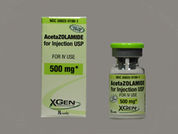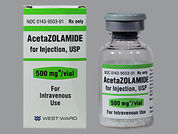Acetazolamide Sodium
Acetazolamide Sodium
What is Acetazolamide Sodium used for?
This medication is used with other medications to treat high pressure inside the eye due to certain types of glaucoma. Acetazolamide belongs to a class of drugs known as carbonic anhydrase inhibitors. It works by decreasing the production of fluid inside the eye. It is also used to decrease a buildup of body fluids (edema) caused by heart failure or certain medications. Acetazolamide can work less well over time, so it is usually used only for a short period. It has also been used with other medications to treat certain types of seizures (petit mal and unlocalized seizures).
CHEMICAL NAME
DRUG TYPE
GlaucomaAcetazolamide Sodium Prices
Searching for the lowest prices
What does Acetazolamide Sodium look like?
View all Acetazolamide Sodium Image Information (2)Acetazolamide Sodium Frequently Asked Questions
If someone has overdosed and has serious symptoms such as passing out or trouble breathing, call 911. Otherwise, call a poison control center right away. US residents can call 1-800-222-1222. Canada residents can call 1-844-764-7669.
IMPORTANT: HOW TO USE THIS INFORMATION: This is a summary and does NOT have all possible information about this product. This information does not assure that this product is safe, effective, or appropriate for you. This information is not individual medical advice and does not substitute for the advice of your health care professional. Always ask your health care professional for complete information about this product and your specific health needs.

